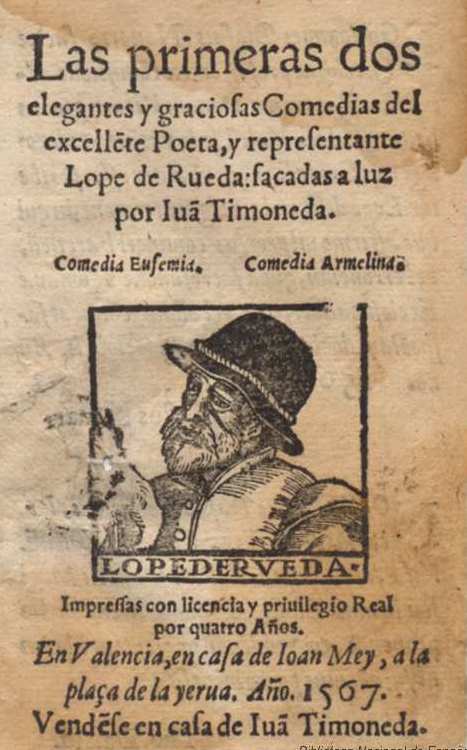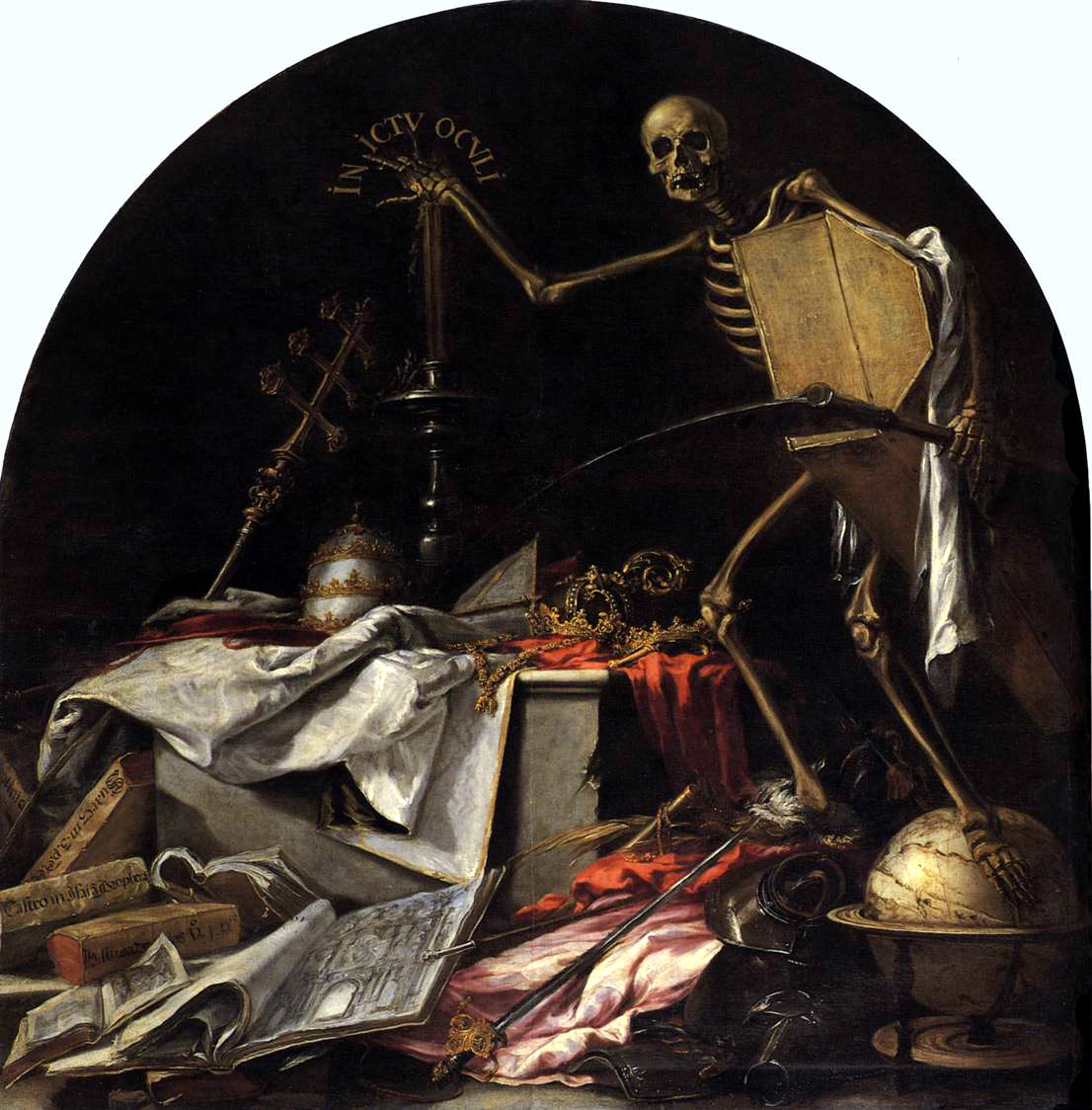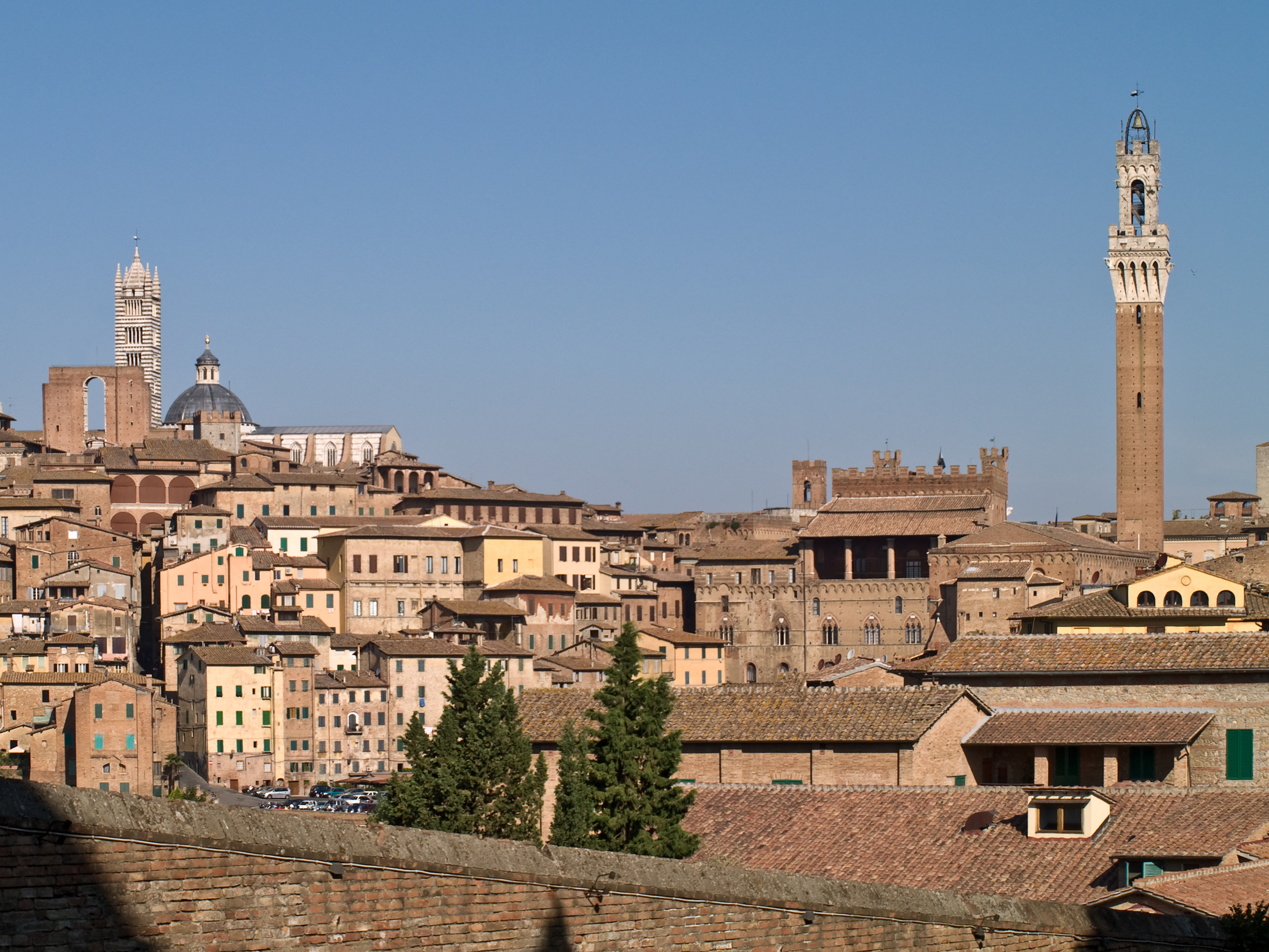|
Lope De Rueda
Lope de Rueda (c.1505<1510–1565) was a Spanish dramatist and author, regarded by some as the best of his era. A versatile writer, he also wrote comedies, farces, and Paso (theatre), pasos. He was the precursor to what is considered the golden age of Spanish literature. His plays are considered a transitional stage between Torres Naharro and Lope de Vega. Early life He was born early in the sixteenth century in Seville, where, according to Miguel de Cervantes, Cervantes, he worked as a metal-beater. His name first occurs in 1554 as acting at Benavente, taking mainly comic roles. Evnetually he got to be, between 1558 and 1561, manager of a strolling company which visited Segovia, Seville, Toledo, Spain, Toledo, Madrid, Valencia (city in Spain), Valencia and Córdoba, Spain, Córdoba. Cervantes, a child at the time, recalled having seen him and his company perform.Works His works were issued posthumously in 156 ...[...More Info...] [...Related Items...] OR: [Wikipedia] [Google] [Baidu] |
Seville
Seville (; es, Sevilla, ) is the capital and largest city of the Spanish autonomous community of Andalusia and the province of Seville. It is situated on the lower reaches of the River Guadalquivir, in the southwest of the Iberian Peninsula. Seville has a municipal population of about 685,000 , and a metropolitan population of about 1.5 million, making it the largest city in Andalusia, the fourth-largest city in Spain and the 26th most populous municipality in the European Union. Its old town, with an area of , contains three UNESCO World Heritage Sites: the Alcázar palace complex, the Cathedral and the General Archive of the Indies. The Seville harbour, located about from the Atlantic Ocean, is the only river port in Spain. The capital of Andalusia features hot temperatures in the summer, with daily maximums routinely above in July and August. Seville was founded as the Roman city of . Known as ''Ishbiliyah'' after the Islamic conquest in 711, Seville became ... [...More Info...] [...Related Items...] OR: [Wikipedia] [Google] [Baidu] |
Byzantine Literature
Byzantine literature is the Greek literature of the Middle Ages, whether written in the territory of the Byzantine Empire or outside its borders.Encyclopædia Britannica - "Greek literature: Byzantine literature" It forms the second period in the history of Greek literature after Ancient Greek literature. Characteristics Many of the classical Greek genres, such as drama and choral lyric poetry, had been obsolete by late antiquity, and all medieval literature in the Greek language was written in an archaizing style, which imitated the writers of ancient Greece. This practice was perpetuated by a long-established system of Greek education where rhetoric was a leading subject. A typical product of this Byzantine education was the Greek Church Fathers, who shared the literary values of their pagan contemporaries. Consequently, the vast Christian literature of the 3rd to 6th centuries established a synthesis of Hellenic and Christian thought. As a result, Byzantine literature was ... [...More Info...] [...Related Items...] OR: [Wikipedia] [Google] [Baidu] |
Spanish Golden Age
The Spanish Golden Age ( es, Siglo de Oro, links=no , "Golden Century") is a period of flourishing in arts and literature in Spain, coinciding with the political rise of the Spanish Empire under the Catholic Monarchs of Spain and the Spanish Habsburgs. The greatest patron of Spanish art and culture during this period was King Philip II (1556–1598), whose royal palace, El Escorial, invited the attention of some of Europe's greatest architects and painters such as El Greco, who infused Spanish art with foreign styles and helped create a uniquely Spanish style of painting. It is associated with the reigns of Isabella I, Ferdinand II, Charles V, Philip II, Philip III, and Philip IV, when Spain was one of the most powerful countries in the world. The start of the Golden Age can be placed in 1492, with the end of the ''Reconquista'', the voyages of Christopher Columbus to the New World, and the publication of Antonio de Nebrija's ''Grammar of the Castilian Language''. It ro ... [...More Info...] [...Related Items...] OR: [Wikipedia] [Google] [Baidu] |
Duke Of Medinaceli
Duke of Medinaceli () is an hereditary title in the peerage of Spain, accompanied by the dignity of Grandee. The Catholic Monarchs, Ferdinand II of Aragon and Isabella I of Castile, created the title and awarded it on 31 October 1479 to Luis de la Cerda y de la Vega. He also held the title of 5th Count of Medinaceli, which was first awarded in 1368 to his ancestor, Bernal de Foix. History In 1368, the King of the Crown of Castile bestowed the title of Count of Medinaceli on Bernal de Foix, the second husband of Isabel de la Cerda. Their grandson Luis, 3rd Count of Medinaceli, eventually inherited the title and changed his family name to " de la Cerda". Later on, Queen Isabella I of Castile raised the title from Count to Duke in 1479 for Luis de la Cerda y de la Vega, 5th Count of Medinaceli. Counts of Medinaceli * Bernal de Foix, 1st Count of Medinaceli (d. 1381). He took the side of the royal bastard Henry of Trastámara in 1368 against Henry's legitimate half-br ... [...More Info...] [...Related Items...] OR: [Wikipedia] [Google] [Baidu] |
Lope De Rueda-Las Quatro Comedias Y Dos Coloquios Pastoriles 7
Lope is an old given name of Basque, Gascon and Spanish origin, derived from Latin ''lupus'', meaning "wolf". Lope may refer to: *Lope de Isásaga (1493–1515), Basque Spanish ''conquistador'' *Lope de Aguirre (1510s – 1561), Basque Spanish ''conquistador'' *Lope de Vega (1562–1635), Spanish poet *Lope Martín, Spanish sailor * Lope Recio Loynaz (1860-1927), Cuban general *Lupo II of Gascony (died 778) * ''Lope'' (film), a 2010 film *Lope de Vega (horse), an Irish bred Thoroughbred racehorse *Lope language, a Loloish language of China * Lopé Department, Gabon * Lope, a type of canter and gallop in horseback riding See also * Lop (other) * Lõpe (other) * López * Loping Airfield, a World War II United States Army Air Forces airfield China * Luoping County, China * Lupe (other) * Ochoa Ochoa ( eu, Otxoa or ''Otsoa'') is a Spanishhttps://www.ancestry.com/name-origin?surname=ochoa surname of Basque origin common throughout Spain, France, the America ... [...More Info...] [...Related Items...] OR: [Wikipedia] [Google] [Baidu] |
Deus Ex Machina
''Deus ex machina'' ( , ; plural: ''dei ex machina''; English "god out of the machine") is a plot device whereby a seemingly unsolvable problem in a story is suddenly and abruptly resolved by an unexpected and unlikely occurrence. Its function is generally to resolve an otherwise irresolvable plot situation, to surprise the audience, to bring the tale to a happy ending, or act as a comedic device. Origin of the expression ''Deus ex machina'' is a Latin calque . The term was coined from the conventions of ancient Greek theater, where actors who were playing gods were brought onto stage using a machine. The machine could be either a crane (''mechane'') used to lower actors from above or a riser that brought them up through a trapdoor. Aeschylus introduced the idea, and it was used often to resolve the conflict and conclude the drama. The device is associated mostly with Greek tragedy, although it also appeared in comedies. Ancient examples Aeschylus used the device in his '' Eume ... [...More Info...] [...Related Items...] OR: [Wikipedia] [Google] [Baidu] |
Bible
The Bible (from Koine Greek , , 'the books') is a collection of religious texts or scriptures that are held to be sacred in Christianity, Judaism, Samaritanism, and many other religions. The Bible is an anthologya compilation of texts of a variety of forms originally written in Hebrew, Aramaic, and Koine Greek. These texts include instructions, stories, poetry, and prophecies, among other genres. The collection of materials that are accepted as part of the Bible by a particular religious tradition or community is called a biblical canon. Believers in the Bible generally consider it to be a product of divine inspiration, but the way they understand what that means and interpret the text can vary. The religious texts were compiled by different religious communities into various official collections. The earliest contained the first five books of the Bible. It is called the Torah in Hebrew and the Pentateuch (meaning ''five books'') in Greek; the second oldest part was a coll ... [...More Info...] [...Related Items...] OR: [Wikipedia] [Google] [Baidu] |
Auto Sacramental
Autos sacramentales (Spanish ''auto'', "act" or "ordinance"; ''sacramental'', "sacramental, pertaining to a sacrament") are a form of dramatic literature which is unique to Spain, though in some respects similar in character to the old Morality plays of England. Origin and History The ''auto sacramental'' may be defined as a dramatic representation of the mystery of the Eucharist. At least this is the definition that would apply to the ''auto'' of the time of Calderón. It does not so well fit, however, those of the preceding century, many of which were sacramental in character only because they were presented during the feast of Corpus Christi. They are usually allegorical, the characters representing, for example, Faith, Hope, Air, Sin, Death, etc. There were some indeed, in which not a single human character appeared, but personifications of the Virtues, the Vices, the Elements, etc. The ''auto sacramental'' was always presented in the streets in connection with the celebrati ... [...More Info...] [...Related Items...] OR: [Wikipedia] [Google] [Baidu] |
Abigail
Abigail () was an Israelite woman in the Hebrew Bible married to Nabal; she married the future King David after Nabal's death ( 1 Samuel ). Abigail was David's second wife, after Saul and Ahinoam's daughter, Michal, whom Saul later married to Palti, son of Laish, when David went into hiding. Abigail became the mother of one of David's sons, who is listed in the Book of Chronicles under the name ''Daniel'', in the Masoretic Text of the Books of Samuel as ''Chileab,'' and in the Septuagint text of 2 Samuel 3:3 as Δαλουια, ''Dalouia''. Her name is spelled Abigal in in the American Standard Version. Name Derived from the Hebrew word ''ab,'' "father", and the Hebrew root ''g-y-l'', "to rejoice," the name Abigail has a variety of possible meanings including "my father's joy" and "source of joy". Biblical narrative In 1 Samuel 25, Nabal demonstrates ingratitude towards David, the son of Jesse (from the tribe of Judah), and Abigail attempts to placate David, in order to ... [...More Info...] [...Related Items...] OR: [Wikipedia] [Google] [Baidu] |
Naval
A navy, naval force, or maritime force is the branch of a nation's armed forces principally designated for naval warfare, naval and amphibious warfare; namely, lake-borne, riverine, littoral zone, littoral, or ocean-borne combat operations and related functions. It includes anything conducted by surface Naval ship, ships, amphibious warfare, amphibious ships, submarines, and seaborne naval aviation, aviation, as well as ancillary support, communications, training, and other fields. The strategic offensive role of a navy is Power projection, projection of force into areas beyond a country's shores (for example, to protect Sea lane, sea-lanes, deter or confront piracy, ferry troops, or attack other navies, ports, or shore installations). The strategic defensive purpose of a navy is to frustrate seaborne projection-of-force by enemies. The strategic task of the navy also may incorporate nuclear deterrence by use of submarine-launched ballistic missiles. Naval operations can be broa ... [...More Info...] [...Related Items...] OR: [Wikipedia] [Google] [Baidu] |
Plautus
Titus Maccius Plautus (; c. 254 – 184 BC), commonly known as Plautus, was a Roman playwright of the Old Latin period. His comedies are the earliest Latin literary works to have survived in their entirety. He wrote Palliata comoedia, the genre devised by the innovator of Latin literature, Livius Andronicus. The word Plautine refers to both Plautus's own works and works similar to or influenced by his. Biography Not much is known about Titus Maccius Plautus's early life. It is believed that he was born in Sarsina, a small town in Emilia Romagna in northern Italy, around 254 BC.''The Concise Oxford Companion to Classical Literature'' (1996) Ed. M.C. Howatson and Ian Chilvers, Oxford University Press, Oxford Reference Online According to Morris Marples, Plautus worked as a stage-carpenter or scene-shifter in his early years. It is from this work, perhaps, that his love of the theater originated. His acting talent was eventually discovered; and he adopted the names "Maccius" (a ... [...More Info...] [...Related Items...] OR: [Wikipedia] [Google] [Baidu] |
Siena
Siena ( , ; lat, Sena Iulia) is a city in Tuscany, Italy. It is the capital of the province of Siena. The city is historically linked to commercial and banking activities, having been a major banking center until the 13th and 14th centuries. Siena is also home to the oldest bank in the world, the Monte dei Paschi bank, which has been operating continuously since 1472. Several significant Renaissance painters worked and were born in Siena, among them Duccio, Ambrogio Lorenzetti, Simone Martini and Sassetta, and influenced the course of Italian and European art. The University of Siena, originally called ''Studium Senese'', was founded in 1240, making it one of the oldest universities in continuous operation in the world. Siena was one of the most important cities in medieval Europe, and its historic centre is a UNESCO World Heritage Site. From January until the end of September of 2021 it had about 217,000 arrivals, with the largest numbers of foreign visitors coming ... [...More Info...] [...Related Items...] OR: [Wikipedia] [Google] [Baidu] |




.jpg)



